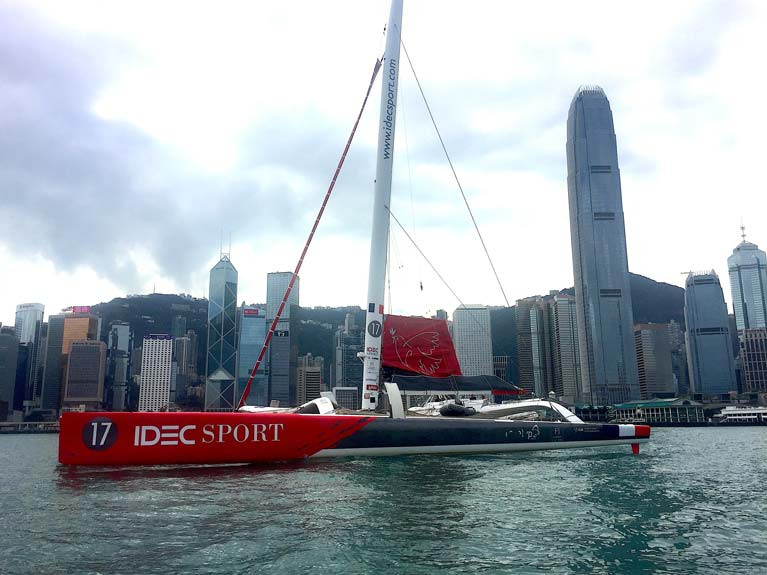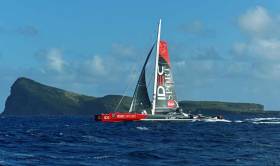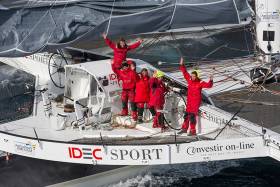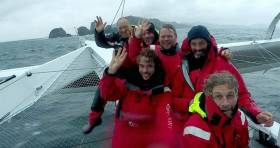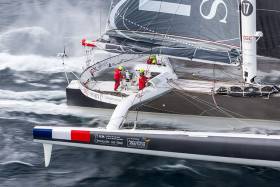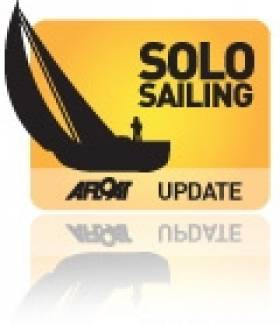Displaying items by tag: Francis Joyon
Francis Joyon to Tackle the Tea Route Record Between Hong Kong & London
Francis Joyon will begin the final Act of the IDEC SPORT ASIAN TOUR at around 0900hrs UTC on Saturday morning with an attempt at the Tea Route record.
On this legendary route between Hong Kong and London, the reference time has been held since 2018 by the Italian, Giovanni Soldini. Once again with his small crew of four, including the boat captain Bertrand Delesne, the assistants and crewmen, Antoine Blouet and Corentin Joyon and his faithful friend, Christophe Houdet, Francis will be sailing on the route he sailed to get to the Far East at the end of last year, but this time in the opposite direction and without stopping. During his outward voyage, he set a new record for the Mauritius Route between Brittany and Mauritius and two new reference times for the trips between Mauritius and Ho Chi Minh City (Vietnam), and then between Vietnam and Shenzhen in China. His latest goal is to complete the voyage back to Europe in a time below that set by the 70-foot trimaran, Maserati and Giovanni Soldini’s crew of 36 days, 2 hours and 37 minutes, when they averaged 17.4 knots.
Following the route taken by the big clippers of the past
“We left Shenzhen yesterday for Hong Kong and the starting area for the record.” Francis is not planning to hang around and intends to set sail on Saturday morning at around 0900hrs UTC. By then, he will have carried out the final adjustments aboard the boat, tightening the tension of the mast and loading up the supplies for the long sprint that lies ahead of around 13,000 theoretical miles. “We have done our utmost in conditions that were not that simple to check the condition of the boat,” added Francis. “The crew is really enthusiastic about this so full of history, symbolising the trade between the British Empire and China. We shall indeed be bringing some tea back to London, as the big clippers of the past used to do. This time it will be organic tea from a fair trade source, as that was something that was important for Christophe Houdet.”
Risk of a cyclone in the Indian Ocean and suspense in the Atlantic
The route is largely characterised by the trade winds that the IDEC SPORT maxi trimaran is looking forward to. “We shall be setting off in some decent conditions,” explained Francis. “They are nothing special, but it does mean sailing downwind in the NE’ly trade winds as we head towards the Sunda Strait and the awesome calms that punished us so much on the way out here. It looks like it is going to be particularly calm around the Equator. Once into the Indian Ocean, there is the risk of a cyclone, where we could face average winds of 35 knots, but we will continue to sail downwind.” Sailing the vast distances in the South and North Atlantic will, as usual, mean dealing with the large Saint Helena high-pressure system in the South and the Azores high in the North, before we make our way right up the English Channel towards the Thames Estuary. “This Tea Route is really the big one for us in our epic adventure,” added the skipper of IDEC SPORT. “Christian Dumard, our weather advisor, expects to see us reach the Cape of Good Hope within the record time. So, there should be a lot of suspense on the climb back up the Atlantic.”
Francis Joyon Smashes Mauritius Route Record on Giant Trimaran
The skipper of the IDEC SPORT maxi-trimaran shattered the Mauritius offshore Route record between Port Louis (Brittany) and Port Louis (Mauritius) at 0726hrs local time (0326hrs UTC) on Friday 8th November).
Francis Joyon smashed the reference time he set in November 2009 by more than six days and brings the Mauritius Route record down to less than 20 days or to be more precise to 19 days, 18 hours, 14 mins and 45 seconds.
The Mauritius Route record is the first act in the new campaign of ocean records, the IDEC SPORT ASIAN TOUR, which the skipper of the IDEC SPORT maxi-trimaran is currently tackling.
The IDEC SPORT Maxi Trimaran Finishes in Record Time
The Maxi Trimaran IDEC SPORT sailed by Francis Joyon, Clément Surtel, Alex Pella, Bernard Stamm, Gwénolé Gahinet and Sébastien Audigane won the Jules Verne Trophy, the outright round the world sailing record, this morning.
They crossed the finish at 0749hrs UTC on Thursday 26th January 2017.
Francis Joyon and his crew sailed the 22,461 theoretical miles in 40 days, 23 hours, 30 minutes and 30 seconds, at an average speed of 22.84 knots.
Out on the water, they actually sailed 26,412 miles at an average speed of 26.85 knots.
They shattered the previous record set by Loïck Peyron and the crew of the maxi trimaran Banque Populaire V by 4 days, 14 hours, 12 minutes and 23 seconds.
During this round the world voyage, they smashed no fewer than six intermediate records at Cape Leeuwin, off Tasmania, on the International Date Line, at Cape Horn, at the Equator and off Ushant.
Francis Joyon Sets a New Record at Cape Horn
The IDEC SPORT maxi-trimaran skippered by Francis Joyon crossed the longitude of Cape Horn, the last of the three major capes in the Jules Verne trophy at 0004 UTC on Thursday 12th January. After leaving Ushant on 16th December, Joyon and his crew of five, Clément Surtel, Sébastien Audigane, Bernard Stamm, Gwénolé Gahinet and Alex Pella have achieved the best intermediate time between Ushant and Cape Horn, completing this stretch in 26 days, 15 hours, 45 minutes some 4 days 6 hours and 35 minutes ahead of the reference time set by Banque Populaire V in 2012 (30 days, 22 hours and 19 minutes).
This is their fourth intermediate record including the Pacific Ocean record between the SE of Tasmania and Cape Horn with a time of 7 days 21 hours and 14 minutes (record held by Bruno Peyron since 2005 with a time of 8 days, 18 hours and 8 minutes).
IDEC-SPORT sailed the 18,332 miles out on the water between Ushant and Cape Horn at an average speed of 28.7 knots.
Jules Verne Trophy reference time / Banque Populaire V (2012): 45 days, 13 hours, 42 minutes and 53 seconds
Jules Verne Trophy: Possible Start Tomorrow for Francis Joyon & His 45–Day Record Bid
The IDEC SPORT maxi-trimaran has just gone to code green, meaning that their departure is imminent. They are about to make another attempt at the outright crewed round the world record, the Jules Verne Trophy.
Francis Joyon and his crew comprising Clément Surtel, Alex Pella, Bernard Stamm, Gwénolé Gahinet and Sébastien Audigane are back in Brest, where they are carrying out the final preparations and stowing supplies on the boat.
The Jules Verne Trophy is awarded to the skipper who breaks the outright record, starting from an imaginary line between the Créac'h lighthouse on Ouessant (Ushant) Island, France, and the Lizard Lighthouse, UK. The current holder is Banque Populaire V skippered by Loick Peyron in 45 days 13 hours 42 minutes 53 seconds.
Joyon's crew completed a circumnavigation earlier this year in a time of 47 days 14 hours 47 minutes and did not break the record.
A window of opportunity has arisen with a start possible in the mid-morning on Thursday from Ushant. It should give them a good time to the Equator, as long as they manage to deal well with the first 36 hours, which look rough off Brittany. Francis Joyon is giving himself a few more hours to think about it before deciding whether to cast off tomorrow or not.
The latest sea state observations and forecasts for the near Atlantic and the weather systems expected in the South Atlantic are being analysed by Marcel van Triest. The Dutch router will provide his final analysis this evening to enable Francis and his crew to take the ultimate decision about whether to set sail shortly or wait until later in the week for the seas to ease.
French trimaran IDEC SPORT Hits 'UFO' 130 Miles off the Irish Coast
The massive French trimaran IDEC SPORT has hit an unidentified floating object during the night, 130 miles off the southwest coast of Ireland. The port rudder is broken. However they are still expected to reach the pontoon in Brest at 1900hrs UTC after its failed Jules Verne Trophy attempt.
At around 0300hrs this morning, just over 130 miles SW of Ireland in heavy seas, the crew on IDEC SPORT heard two big bangs, indicating that they had hit an unidentified floating object (a container, plank of wood, or something else?).
Once they had got over the scare, Francis Joyon’s crew saw that the port rudder was broken. On the starboard tack, only the central rudder can be used to steer the boat. Six hours after suffering this damage, IDEC SPORT was still making 30 knots towards the finish, which at 0900hrs this morning was 230 miles away. So for the time being the men are still expected to finish in Brest at around 1900hrs this evening.
Solo Sailor Embarks on North Atlantic Record;5 days,19 hours, 30 minutes & 40 seconds
The French sailor, Francis Joyon is due to set off early today (Tuesday 11th June) to tackle the solo Atlantic crossing aboard his maxi trimaran IDEC. He is expected to cross the official starting line at the foot of Ambrose Light off New York between 0000hrs and 0600hrs GMT (0200hrs – 0800hrs CET). He will be facing the Atlantic alone all the way to the Lizard at the southernmost tip of Cornwall and is hoping to complete the voyage in less than 5 days, 19 hours, 30 minutes and 40 seconds in order to have his name added to the registers of the World Speed Sailing Record Council in place of the current holder, Thomas Coville. Francis Joyon would achieve two success in one, if he does this. He will be regaining a title that was his until 2008, and above all will become the only man to hold the four most important solo sailing records, the Round the World Record, the 24-hour distance record, the Columbus Route record and the North Atlantic record.
A decent weather opportunity
"The weather opportunity tonight is looking decent," according to Jean-Yves Bernot, the leading light in ocean racing navigation, who continues to assists Francis Joyon is his major sailing challenges. To put it simply, the conditions are looking favourable, if not ideal, but are decent enough to allow him to make this attempt. Back in France, the two men had been watching a low-pressure area develop over the continent of North America, offering the strength and trajectory that suits this record, which over the years has become increasingly difficult to beat. During the weekend, Francis Joyon was more and more certain of the situation and decided to climb aboard a plane yesterday to head for New York, where he will get back with his giant trimaran IDEC, currently moored in Gateway Marina in Brooklyn, New York.
A possible start at between midnight and six (GMT)
The hulls will be cleaned, the final supplies stowed aboard, and as usual, everything will be done all by himself. Joyon will run through the final details about the weather situation tonight with Jean-Yves Bernot, before setting off on the perilous journey to the starting line and the former site of the legendary Ambrose Light at the entrance to the bay off New York. The light itself was removed in 2008 after a series of collisions, and has now been replaced by a set of lit buoys. If he sets off between midnight and six (GMT), he will be able to make the most of the daylight to cover the tricky miles sailing his boat up out of the river. The low that is passing over Labrador should allow him to sail along in steady thirty-knot winds blowing from the east-south-east on seas that should be easy to deal with for at least the first two-thirds of the course. As is often the case in these record attempts, it is the final phase, as they approach the British Isles, which are the most uncertain. The winds are likely to strengthen towards the end of the week, making it more complicated for the solo sailor. However, with the low moving along fairly high up to the north, it should allow IDEC to stay close to the direct route, and therefore get the best trajectory towards the Channel approaches, and sail along efficiently towards the Lizard.
New York – The Lizard, 2880 theoretical nautical miles (or 5334 km).
Solo North Atlantic records
1987: Bruno Peyron, Explorer catamaran, in 11 days, 11 hours 46 minutes and 36 seconds
1990: Florence Arthaud, Pierre 1er trimaran, in 9 days, 21 hours and 42 minutes
1992: Bruno Peyron, Explorer catamaran, in 9 days, 19 hours and 22 minutes
1994: Laurent Bourgnon, Primagaz trimaran, in 7 days, 2 hours, 34 minutes and 42 seconds
2005: Francis Joyon, IDEC 1 trimaran, in 6 days, 4 hours, 1 minute and 37 seconds
2008: Thomas Coville, Sodebo trimaran, in 5 days, 19 hours, 29 minutes and 20 seconds
The three major solo records already held by Francis Joyon aboard IDEC
2008: Solo Round the World record in 57 days, 13 hours 34 minutes and 06 seconds
2012: Distance sailed in 24h: 666 miles at an average speed of 27.75 knots
2013: Columbus Route Cadiz-San Salvador: 8 days 16 h 07 minutes and 05 seconds.


























